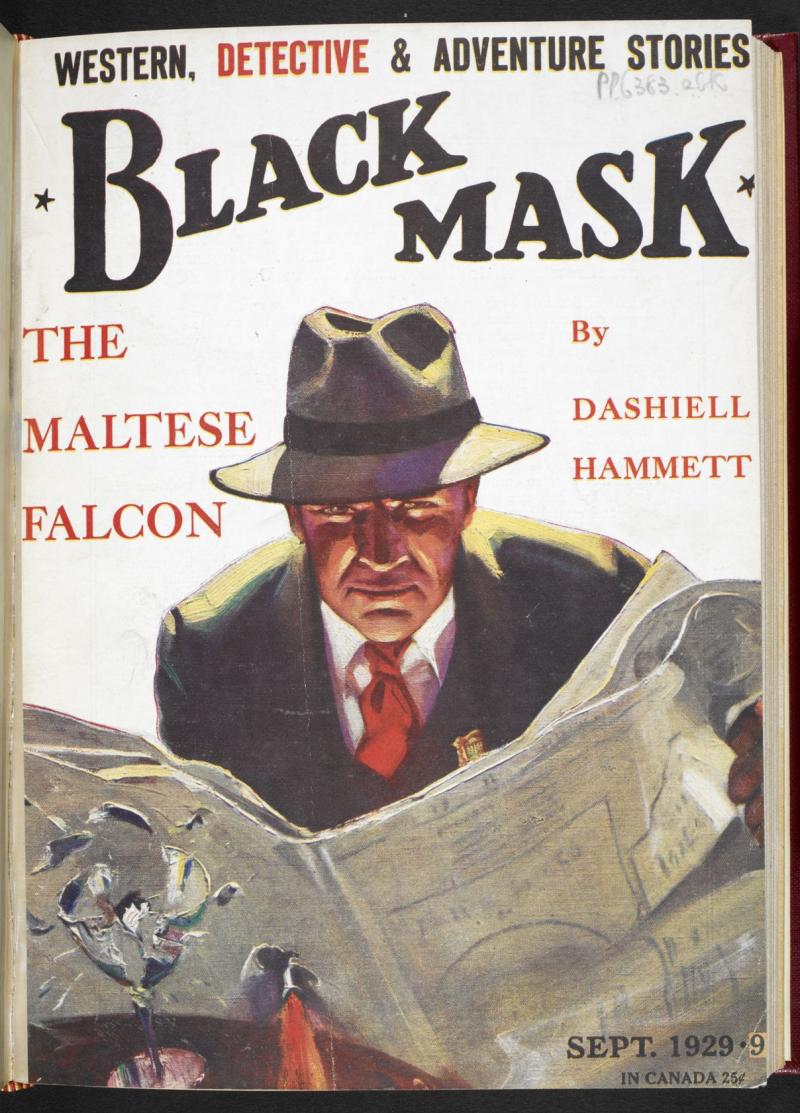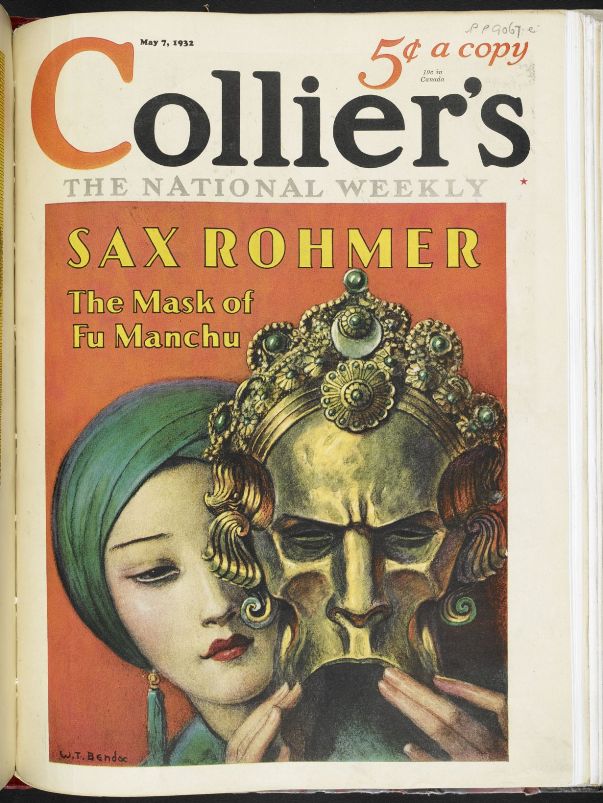Murder in the Library: An A-Z of Crime Fiction, British Library | reviews, news & interviews
Murder in the Library: An A-Z of Crime Fiction, British Library
Murder in the Library: An A-Z of Crime Fiction, British Library
A frustratingly brief skim through the art of crime

Crime fiction once lured you in with lurid covers acting like a B-movie poster or fairground barker, selling the promise of thrills within. The British Library’s new exhibition is disappointingly light on such disreputable fare, and much too brief. But within its self-imposed limits it manages to indicate the genre’s range, and illuminate some forgotten corners.
The small, alphabetically themed gallery includes a couple of the treasures otherwise locked in the Library’s archive. The neat, unmarked text of Conan Doyle’s manuscript for a late Holmes story, “The Adventure of the Retired Colourman” (1926), suggests a writer too bored of his Victorian detective to agonise over words. Odder is a startlingly labour-intensive Thirties “crime dossier” by Dennis Wheatley and JG Links, with physical clues such as human hair and cigarette ends pocketed in cellophane pouches, as if it’s an actual Scotland Yard case file, and the solution in a sealed envelope (according to genre expert Christopher Fowler, workers at the printers took books home to provide the cigarettes and struck matches; nuns gave their hair to this criminal enterprise). More visually impressive and equally extravagant is a 1933 “puzzle” tale with an actual jigsaw central to its narrative - a colourfully dramatic collector’s item (pictured below). Sax Rohmer’s criminal mastermind Fu Manchu (of whom Osama bin Laden’s media image often seemed an update) has his “Yellow Peril”-baiting properties downplayed, in favour of a dignified line-drawing, and stylishly enigmatic Collier’s cover (pictured below right).
 Though there are early examples of Nordic noir and UK editions of Georges Simenon’s Maigret novels, the Library’s UK and North American emphasis leaves no room for France’s distinctive black-bound série noire volumes, source of film noir’s name and much of its content. The exhibition is instead weighted towards the “Golden Age” country house puzzle-solving of Agatha Christie and co., including Miss Marple’s debut in a 1927 issue of The Royal magazine, and her inheritor Colin Dexter’s first Morse paperback a half-century later, Last Bus to Woodstock. The finest illustration here of what Colin Wilson called the “Mayhem Parva” – a rustic English idyll infected by crime’s chaos – is the 1987 Caroline Graham novel, The Killings at Badger’s Drift, inspiration for TV's batty Midsomer Murders. Its cover shows an ancient church and Tudor house, shadows darkening a green hedge, and blood scumming over the village pond.
Though there are early examples of Nordic noir and UK editions of Georges Simenon’s Maigret novels, the Library’s UK and North American emphasis leaves no room for France’s distinctive black-bound série noire volumes, source of film noir’s name and much of its content. The exhibition is instead weighted towards the “Golden Age” country house puzzle-solving of Agatha Christie and co., including Miss Marple’s debut in a 1927 issue of The Royal magazine, and her inheritor Colin Dexter’s first Morse paperback a half-century later, Last Bus to Woodstock. The finest illustration here of what Colin Wilson called the “Mayhem Parva” – a rustic English idyll infected by crime’s chaos – is the 1987 Caroline Graham novel, The Killings at Badger’s Drift, inspiration for TV's batty Midsomer Murders. Its cover shows an ancient church and Tudor house, shadows darkening a green hedge, and blood scumming over the village pond.
 America’s opposing, hard-boiled tradition doesn’t get much beyond its allotted “H”, with Dashiell Hammett’s sole Sam Spade story The Maltese Falcon and Raymond Chandler’s 1944 wartime collection, The Finger Men and Other Stories, its cover combining a fistful of dollars, a roulette wheel and one of those fleshily sexy, hard-eyed dames who complicate the life of LA’s soiled knight-errant Philip Marlowe.
America’s opposing, hard-boiled tradition doesn’t get much beyond its allotted “H”, with Dashiell Hammett’s sole Sam Spade story The Maltese Falcon and Raymond Chandler’s 1944 wartime collection, The Finger Men and Other Stories, its cover combining a fistful of dollars, a roulette wheel and one of those fleshily sexy, hard-eyed dames who complicate the life of LA’s soiled knight-errant Philip Marlowe.
James Lee Burke’s Marlowe update, the less restrained alcoholic Louisiana detective Dave Robicheaux, is represented by the post-Katrina novel The Tin Roof Blowdown (2007). The TV signal interference-lines slicing its cover image of New Orleans’ drowned city may one day offer the resonance of older volumes. But though today’s genre has reached a popular peak, the general quality of its books as objects is at a low – giant authors’ names looming over lazy, shadowy scenes. The literarily fine likes of Ian Rankin’s Rebus are leaving little to tempt an exhibition such as this which, though too slight to go out of your way for, gives pleasurably odd clues to crime fiction’s appeal.
- Murder at the Library: An A-Z of Crime Fiction at the British Library until 12 May
Explore topics
Share this article
The future of Arts Journalism
You can stop theartsdesk.com closing!
We urgently need financing to survive. Our fundraising drive has thus far raised £49,000 but we need to reach £100,000 or we will be forced to close. Please contribute here: https://gofund.me/c3f6033d
And if you can forward this information to anyone who might assist, we’d be grateful.

Subscribe to theartsdesk.com
Thank you for continuing to read our work on theartsdesk.com. For unlimited access to every article in its entirety, including our archive of more than 15,000 pieces, we're asking for £5 per month or £40 per year. We feel it's a very good deal, and hope you do too.
To take a subscription now simply click here.
And if you're looking for that extra gift for a friend or family member, why not treat them to a theartsdesk.com gift subscription?
more Visual arts
 'We are bowled over!' Thank you for your messages of love and support
Much-appreciated words of commendation from readers and the cultural community
'We are bowled over!' Thank you for your messages of love and support
Much-appreciated words of commendation from readers and the cultural community
 Lee Miller, Tate Britain review - an extraordinary career that remains an enigma
Fashion photographer, artist or war reporter; will the real Lee Miller please step forward?
Lee Miller, Tate Britain review - an extraordinary career that remains an enigma
Fashion photographer, artist or war reporter; will the real Lee Miller please step forward?
 Kerry James Marshall: The Histories, Royal Academy review - a triumphant celebration of blackness
Room after room of glorious paintings
Kerry James Marshall: The Histories, Royal Academy review - a triumphant celebration of blackness
Room after room of glorious paintings
 Folkestone Triennial 2025 - landscape, seascape, art lovers' escape
Locally rooted festival brings home many but not all global concerns
Folkestone Triennial 2025 - landscape, seascape, art lovers' escape
Locally rooted festival brings home many but not all global concerns
 Sir Brian Clarke (1953-2025) - a personal tribute
Remembering an artist with a gift for the transcendent
Sir Brian Clarke (1953-2025) - a personal tribute
Remembering an artist with a gift for the transcendent
 Emily Kam Kngwarray, Tate Modern review - glimpses of another world
Pictures that are an affirmation of belonging
Emily Kam Kngwarray, Tate Modern review - glimpses of another world
Pictures that are an affirmation of belonging
 Kiefer / Van Gogh, Royal Academy review - a pairing of opposites
Small scale intensity meets large scale melodrama
Kiefer / Van Gogh, Royal Academy review - a pairing of opposites
Small scale intensity meets large scale melodrama
 Jenny Saville: The Anatomy of Painting, National Portrait Gallery review - a protégé losing her way
A brilliant painter in search of a worthwhile subject
Jenny Saville: The Anatomy of Painting, National Portrait Gallery review - a protégé losing her way
A brilliant painter in search of a worthwhile subject
 Abstract Erotic, Courtauld Gallery review - sculpture that is sensuous, funny and subversive
Testing the boundaries of good taste, and winning
Abstract Erotic, Courtauld Gallery review - sculpture that is sensuous, funny and subversive
Testing the boundaries of good taste, and winning
 Edward Burra, Tate Britain review - watercolour made mainstream
Social satire with a nasty bite
Edward Burra, Tate Britain review - watercolour made mainstream
Social satire with a nasty bite
 Ithell Colquhoun, Tate Britain review - revelations of a weird and wonderful world
Emanations from the unconscious
Ithell Colquhoun, Tate Britain review - revelations of a weird and wonderful world
Emanations from the unconscious
 Rachel Jones: Gated Canyons, Dulwich Picture Gallery review - teeth with a real bite
Mouths have never looked so good
Rachel Jones: Gated Canyons, Dulwich Picture Gallery review - teeth with a real bite
Mouths have never looked so good

Add comment